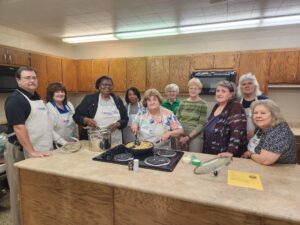Learning to Cook & Eat the Med Way
go.ncsu.edu/readext?940069
en Español / em Português
El inglés es el idioma de control de esta página. En la medida en que haya algún conflicto entre la traducción al inglés y la traducción, el inglés prevalece.
Al hacer clic en el enlace de traducción se activa un servicio de traducción gratuito para convertir la página al español. Al igual que con cualquier traducción por Internet, la conversión no es sensible al contexto y puede que no traduzca el texto en su significado original. NC State Extension no garantiza la exactitud del texto traducido. Por favor, tenga en cuenta que algunas aplicaciones y/o servicios pueden no funcionar como se espera cuando se traducen.
Português
Inglês é o idioma de controle desta página. Na medida que haja algum conflito entre o texto original em Inglês e a tradução, o Inglês prevalece.
Ao clicar no link de tradução, um serviço gratuito de tradução será ativado para converter a página para o Português. Como em qualquer tradução pela internet, a conversão não é sensivel ao contexto e pode não ocorrer a tradução para o significado orginal. O serviço de Extensão da Carolina do Norte (NC State Extension) não garante a exatidão do texto traduzido. Por favor, observe que algumas funções ou serviços podem não funcionar como esperado após a tradução.
English
English is the controlling language of this page. To the extent there is any conflict between the English text and the translation, English controls.
Clicking on the translation link activates a free translation service to convert the page to Spanish. As with any Internet translation, the conversion is not context-sensitive and may not translate the text to its original meaning. NC State Extension does not guarantee the accuracy of the translated text. Please note that some applications and/or services may not function as expected when translated.
Collapse ▲ Recent graduates of Cooperative Extension’s 6-week “Med Instead of Meds” class series learned about the Mediterranean-style eating pattern, shown to promote health and decrease risk of many chronic diseases. The Mediterranean-style eating pattern
Recent graduates of Cooperative Extension’s 6-week “Med Instead of Meds” class series learned about the Mediterranean-style eating pattern, shown to promote health and decrease risk of many chronic diseases. The Mediterranean-style eating pattern
incorporates the basics of healthy eating that are traditionally practiced in countries that border the Mediterranean Sea.
Eating the Mediterranean way:
- Decreases the risk of some forms of cancer.
- Is more effective than a low-fat diet for weight loss in overweight and obese individuals.
- Protects against cognitive decline by protecting the small blood vessels in the brain. 40% lower risk of developing Alzheimer’s when you eat the Med way.
- May improve eye health including decreasing the risk of macular degeneration.
- Decreases the risk of type 2 diabetes. In one study, the risk of developing type 2 diabetes was reduced by 52% when eating the Med way.
- Can help manage blood pressure.
- Can reduce the risk of cardiovascular disease (CVD) as much as 30–60%.
 The Mediterranean-style eating pattern is not only healthy, it is delicious and satisfying. Participants prepared several recipes that help incorporate fruits & vegetables, plant-based foods, whole grains, nuts & seeds, olive oil, herbs & spices, and seafood as an everyday part of the diet.
The Mediterranean-style eating pattern is not only healthy, it is delicious and satisfying. Participants prepared several recipes that help incorporate fruits & vegetables, plant-based foods, whole grains, nuts & seeds, olive oil, herbs & spices, and seafood as an everyday part of the diet.
Fourteen students (including two couples, two County Extension Advisory Council members, 3 Extension & Community Association members, and several county employees) completed the series, learning to plan, shop, and cook. Five (5) volunteers helped Extension Family & Consumer Sciences Agent Nancy Abasiekong facilitate the class.




